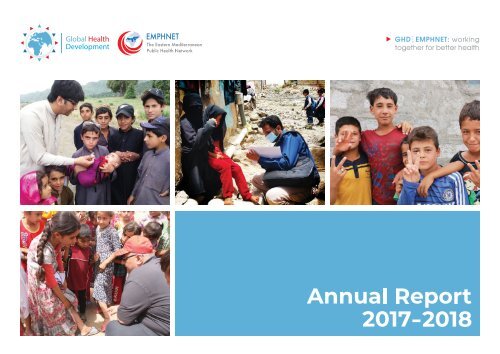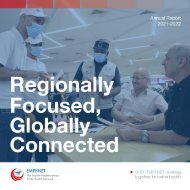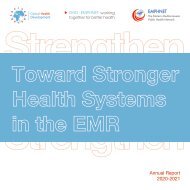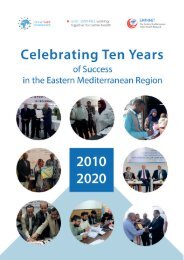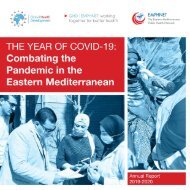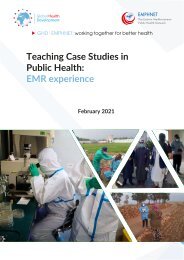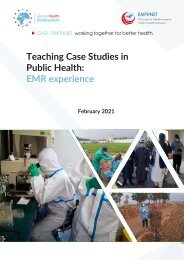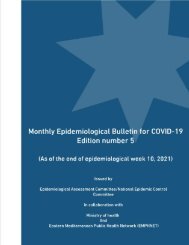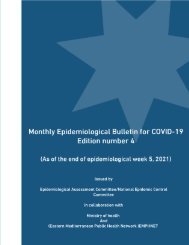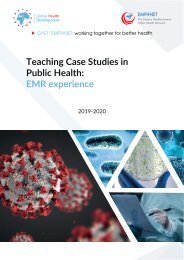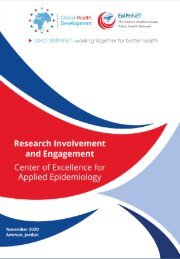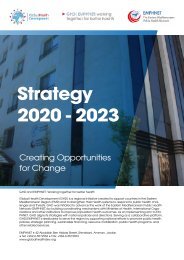Create successful ePaper yourself
Turn your PDF publications into a flip-book with our unique Google optimized e-Paper software.
GHD EMPHNET ANNUAL REPORT <strong>2017</strong> - <strong>2018</strong><br />
1
Table of<br />
Contents<br />
Chairperson Message<br />
Foreword<br />
Executive summary<br />
Introduction<br />
Growing from Within<br />
Growing a Network of Partnerships and Collaborations<br />
Growing in the Area of Field Epidemiology<br />
4<br />
6<br />
8<br />
10<br />
12<br />
13<br />
14<br />
15<br />
Growing in the Area of Routine Immunization<br />
Growing Digitally<br />
Supporting Sustainable Developmental Goals<br />
The Sixth EMPHNET Regional Conference<br />
Growing with plans for the future<br />
16<br />
20<br />
22<br />
24<br />
26<br />
GHD EMPHNET ANNUAL REPORT <strong>2017</strong> - <strong>2018</strong><br />
3
Chairperson<br />
Message<br />
It is my privilege to present the <strong>Annual</strong> Report<br />
for <strong>2017</strong>-18. I am humbled and honored<br />
to work together with a group of dedicated<br />
Board members and the exceptional leadership<br />
team of EMPHNET to support health systems<br />
in the Eastern Mediterranean (EMR).<br />
No year comes without challenges, and this<br />
-<br />
tinue to be impacted by instability and outbreaks.<br />
Nonetheless, we have been through<br />
in the region, have learned the importance of<br />
remaining focused towards our mission and<br />
objectives. We remain absolutely committed<br />
to supporting countries achieve better health<br />
outcomes and, eventually, sustainable development<br />
in all areas of public health.<br />
Today, EMPHNET is in an exemplary position<br />
thanks to the skills and commitment of our<br />
teams, which remain dedicated to providing<br />
quality support to all our member programs.<br />
As the Chairperson, I am proud of EMPHNET.<br />
Proud of an organization that was able to professionalize<br />
itself and adapt to the challenges<br />
of our times while staying attentive to what<br />
we do best: support “People in the Eastern<br />
Mediterranean Region lead healthy lives and<br />
well-being”. We need to keep working to reinforce<br />
our position while remaining organized<br />
and committed to our mission. At the same<br />
time, we must not forget that our organization<br />
does not exist on its own, but through<br />
the interaction and integration of the people<br />
who are part of it. We should also keep in<br />
mind that it cannot deliver without informed<br />
of these requires a proactive approach and<br />
communicating appropriately, without ignoring<br />
the need to regularly monitor and assess<br />
their impact.<br />
Since 2009, we have been gradually growing<br />
in both geographic and technical terms. Tomade<br />
in this area resulted in tangible results.<br />
We’re on the right path! I would also like to<br />
emphasize that we have expanded our network<br />
to reach more countries: Bangladesh,<br />
Libya, Sudan and Tunisia. The expansion of<br />
geographic presence creates a stronger network:<br />
our network is now better able to go<br />
further, to make voice of the EMR heard in<br />
forums and international meetings. Indeed,<br />
contributing to sustainable development, often<br />
in partnership with other health actors, is<br />
one of EMPHNET strengths.<br />
In conclusion, I would like to pay special<br />
thanks to all our partner donors for the trust<br />
thay vested in us, for supporting our programs<br />
in Disease Control, Health Protection<br />
and Promotion, Polio and Routine Immunization,<br />
Outreach and Emergency and Research<br />
and Policy.<br />
To all, thank you.<br />
Associate Prof. Dr. Bashir Noormal<br />
Chair of the Board of Directors of FETP of the<br />
Eastern Mediterranean Public Health Network<br />
and Director General Afghanistan National Public<br />
Health Institute<br />
4<br />
GHD EMPHNET ANNUAL REPORT <strong>2017</strong> - <strong>2018</strong>
On December 4, <strong>2018</strong>, Dr. Dionisio Herrera, Director of TEPHINET, passed away after a life of contribution to public health across the globe. Towards<br />
-<br />
miology in the region.<br />
Board of Directors Meeting<br />
GHD EMPHNET ANNUAL REPORT <strong>2017</strong> - <strong>2018</strong><br />
5
Foreword<br />
This has been a very successful year for GHD/<br />
EMPHNET. Our organization has expanded<br />
we have made a number of particularly notable<br />
achievements. Major projects that we<br />
recently embarked on are progressing very<br />
satisfactorily. And many new opportunities<br />
are opening up for us. We face a very exciting<br />
future. GHD/EMPHNET presence has expand-<br />
Iraq, Libya and Yemen. We have also established<br />
new partnerships to add to already existing<br />
ones with renown international organizations.<br />
We are especially looking forward to the<br />
growth of our organization because this<br />
opens up new opportunities for us to act as<br />
an umbrella network for country programs<br />
to come together, to share their experiences<br />
and knowledge, and to support each other.<br />
None of what we have achieved would have<br />
been possible without an active and support-<br />
ing success.<br />
Despite the fact that EMR is a troubled part of<br />
-<br />
the world, all parties recognize that the future<br />
of the region depends on insuring healthier<br />
communities. However, instability continues<br />
to hamper any attempt to reach that common<br />
goal.<br />
Our strategy to overcome this is to establish<br />
ourselves as the point of linkage between international<br />
collaborators and local partners<br />
in countries of the region. We have made a<br />
lot of progress but there is still a lot of work<br />
to be done. In all countries within our geographic<br />
scope we are privileged to be able to<br />
work with inspiring, committed and creative<br />
people, and we are very pleased about the<br />
level of sustainability of the work that’s being<br />
accomplished.<br />
GHD/EMPHNET faces many challenges, instructure<br />
of the organization as we continue<br />
to expand. Also, in these times of shrinking<br />
resources for development purposes, there’s<br />
funding to support our projects. In order to<br />
address this issue, we are examining ways to<br />
diversify our funding sources.<br />
In summary, I believe it has been a great year.<br />
Dr. Mohannad Al Nsour<br />
Executive Director, EMPHNET<br />
6<br />
GHD EMPHNET ANNUAL REPORT <strong>2017</strong> - <strong>2018</strong>
FETP Iraq in the Field<br />
GHD EMPHNET ANNUAL REPORT <strong>2017</strong> - <strong>2018</strong><br />
7
Executive<br />
Summary<br />
Since its establishment in 2009, EMPHNET has<br />
been an active player in the Eastern Mediterranean<br />
Region with its health system support<br />
this cumulative experience, the organization<br />
has continued to expand its coverage in geography<br />
and disciplines in response to the growing<br />
demand on the ground. To better cater to<br />
this expansion, it has grown and reorganized<br />
internally as well. This report illustrates the<br />
organization’s achievements in <strong>2017</strong>-<strong>2018</strong>,<br />
and its plans for the future.<br />
-<br />
erment Program (PHEP) launched an assortment<br />
of PHEP pathways; of these pathways<br />
participates were able to graduate from the<br />
Basic Field Epidemiology and Surveillance for<br />
-<br />
triculated from the intermediate to advance<br />
pathways.<br />
GHD/EMPHNET was present in a number of<br />
international meetings and conferences, and<br />
participated with experience and proposals in<br />
several areas including mental, sexual and reproductive<br />
health, disease surveillance, outbreak<br />
alert and response, training and others.<br />
In terms of capacity building, workshops and<br />
training sessions for health professionals<br />
areas of emergency response and immunization,<br />
as well as training on new software<br />
public health.<br />
The 6th EMPHNET Regional Conference was<br />
conducted in March <strong>2018</strong> under the theme<br />
“Innovative Approaches: Adapting to the Current<br />
EMR Context”, which oversaw 6 preconference<br />
workshops, 6 roundtable discussions,<br />
as well as 147 oral and poster presentations.<br />
During the conference, the organization<br />
launched its 1st digital networking platform,<br />
EpiShares.<br />
GHD/EMPHNET provided and continues to<br />
provide support for countries in reaching<br />
their SDGs in the areas of good health and<br />
well-being, gender equality, water and sanitation,<br />
and partnership for the goals. Plans for<br />
the future include launching the Public Health<br />
Forum, the International Academy of Public<br />
Health and the Public Health Emergency Response<br />
Center.<br />
8<br />
GHD EMPHNET ANNUAL REPORT <strong>2017</strong> - <strong>2018</strong>
Workshop, Jordan<br />
GHD EMPHNET ANNUAL REPORT <strong>2017</strong> - <strong>2018</strong><br />
9
Introduction<br />
Global Health Development and the Eastern<br />
Mediterranean Public Health Network<br />
(GHD/EMPHNET) have been operating in<br />
the Eastern Mediterranean Region (EMR) – a<br />
region that is synonymous with socio/political<br />
unrest – since 2009. Such unrest continhealth<br />
development. Many countries in the<br />
region are challenged by health adversities<br />
and threats that overload their health systems<br />
which are already overstrained due to<br />
inadequate resources and disease burden.<br />
Upon its establishment, EMPHNET’s primary<br />
focus was to support the Field Epidemiology<br />
Training Programs (FETPs). These programs<br />
aim to strengthen the human resources<br />
component that serves as an essential<br />
building block for improving health systems<br />
performance. However, over the years, and<br />
with the increasing demand from several<br />
EMR countries to develop capacities in oth-<br />
-<br />
ology, the organization broadened its scope<br />
to include emergency response, health protection<br />
and promotion, health security, and<br />
bio-risk management.<br />
Such expansion brought a demand for<br />
growth both internally and externally,<br />
prompting GHD/EMPHNET to seek collaboration<br />
with a wider range of partners in an<br />
attempt to address public health issues that<br />
are of importance to EMR countries and to<br />
the global public health community, and to<br />
Today, GHD/EMPHNET is committed to support<br />
EMR countries in strengthening their<br />
health systems performance by identifying<br />
priorities and providing new opportunities<br />
an adequate public health infrastructure.<br />
expansion, as the organization revamped<br />
its structure and operations to respond to<br />
the expanding number of countries, initiatives,<br />
partnerships, and causes it supports.<br />
And with growth being an ongoing process,<br />
this year was the start of an accelerating<br />
journey towards the future.<br />
10<br />
GHD EMPHNET ANNUAL REPORT <strong>2017</strong> - <strong>2018</strong>
FETP Iraq Training<br />
GHD EMPHNET ANNUAL REPORT <strong>2017</strong> - <strong>2018</strong><br />
11
Growing<br />
from Within<br />
To accommodate the rapid growth within<br />
GHD/EMPHNET over the past few years,<br />
there was a need to strengthen internal organizational<br />
capacities. As a result, the Organizational<br />
Development Initiative (ODI)<br />
-<br />
sponse to changing public health needs and<br />
In line with the increasing number of projects,<br />
GHD/EMPHNET also saw the launch of<br />
maintains and ensures standards for project<br />
management across all levels of project<br />
implementation, and monitors the projects’<br />
status and direction, to deliver value and informed<br />
outcomes to partners.<br />
GHD/EMPHNET Team During<br />
Internal Meeting, Jordan<br />
The ODI focuses on four internal developmental<br />
areas to prepare the organization for<br />
long-term growth: organizational restructuring,<br />
business process improvement, the<br />
development of an authority matrix, and an<br />
phase of this initiative comprised the development<br />
of a new corporate structure, more<br />
-<br />
zation is engaged in. This new structure included<br />
the establishment of a unit dedicated<br />
to research, as well as the environmental<br />
health department that works within the<br />
-<br />
icology, exposure science, environmental<br />
engineering and environmental law.<br />
for the establishment of GHD/EMPHNET’s<br />
-<br />
all operations of the organization. Its responsibilities<br />
were further enhanced to<br />
encompass units dedicated to quality management,<br />
partnerships and resource mobilization.<br />
grants and the external operations as well<br />
On another note, GHD/EMPHNET introduced<br />
the business automation system with<br />
the aim of becoming a paper-free organization<br />
by 2020.<br />
12<br />
GHD EMPHNET ANNUAL REPORT <strong>2017</strong> - <strong>2018</strong>
Growing a Network of Partnerships<br />
and Collaborations<br />
GHD/EMPHNET has always made knowledge<br />
sharing a main focus, thriving on partnerships<br />
and agreements, and participating<br />
in regional and global conferences. Being an<br />
active member in several organizations and<br />
working groups, it was involved in a number<br />
Global Engagement<br />
Partnerships<br />
CDC, BEP-<br />
CTR, DTRA,<br />
Ministries<br />
of Health<br />
Academic<br />
Institutions<br />
Public Health<br />
Institutions<br />
WHO, UNHCR,<br />
UNICEF, IOM<br />
Private<br />
Sector<br />
International agencies –<br />
IDRC, IMC, CRDF Global<br />
GHD EMPHNET ANNUAL REPORT <strong>2017</strong> - <strong>2018</strong><br />
13
Growing in the Area<br />
of Field Epidemiology<br />
Over the years, GHD/EMPHNET has continued<br />
to support FETPs in the region as a<br />
mechanism for enhancing health system<br />
-<br />
tion saw the results of initiatives it had established<br />
in 2016-<strong>2017</strong>, including the launch<br />
of the Public Health Empowerment Program<br />
(PHEP) following consultation and close collaboration<br />
with the countries it supports in<br />
the EMR.<br />
PHEP is a three-month in-service training<br />
program that focuses on detection of and<br />
response to diseases and events of public<br />
health importance. Trainees include health<br />
workers from the governorate and district<br />
health levels, at any of the preventive sector<br />
departments and health facilities. They<br />
work in the areas of epidemiology and surveillance,<br />
communicable diseases, expanded<br />
program on immunization (EPI), infection<br />
control, environmental health, food<br />
and water safety, occupational health, vector-borne<br />
diseases, health centers, health<br />
workers at points of entry and other areas.<br />
-<br />
iations: PHEP-BFE (Basic Field Epidemiology)<br />
and PHEP-SPO (Surveillance for Polio<br />
Egypt, Sudan, and Iraq, with plans to see the<br />
launch of PHEP-Nutrition in Sudan. GHD/<br />
EMPHNET is looking to further explore online<br />
training as an option to expand its capacity<br />
building reach in the future.<br />
The FETP advanced and intermediate programs<br />
saw the launch of the Yemen FETP<br />
-<br />
hort in Tunisia.<br />
FETP Yemen in the Field<br />
14<br />
GHD EMPHNET ANNUAL REPORT <strong>2017</strong> - <strong>2018</strong>
Growing Rapid and<br />
Emergency Response Efforts<br />
Populations across the EMR have been afdroughts,<br />
and earthquakes, in addition to<br />
-<br />
by increasing the region’s fragility and complexity.<br />
Hundreds of thousands of people<br />
have died and millions have been displaced.<br />
within emergency rapid response was held in<br />
Yemen.<br />
In Sudan, workshops for developing an accountability<br />
framework for Health Emergency<br />
Operations and developing state-level health<br />
emergency plan were held.<br />
immediate wake of disasters.<br />
engage with health security and emergency<br />
response projects by improving emergency<br />
response capacities and assessment of biosafety.<br />
A number of Rapid Response Team (RRT)<br />
training workshops were held in Iraq, Tunisia<br />
and Egypt between December <strong>2017</strong> and<br />
September <strong>2018</strong>, targeting professionals at<br />
the national and governate levels. Training<br />
of Trainers (ToT) workshops were also held in<br />
Iraq and Sudan for RRTs, while a ToT on water,<br />
sanitation and hygiene (WASH) principles<br />
An assessment of the biosafety and biosecurity<br />
capacities of public health and animal<br />
health laboratories in main Iraqi provinces<br />
was conducted to identify training needs and<br />
opportunities for enhanced collaboration.<br />
Also in Iraq, a meeting for stakeholders involved<br />
in the Iraq Mass Gathering Project in<br />
Baghdad was organized to discuss training<br />
activities for the project’s data collectors.<br />
RRT Training, Sudan<br />
GHD EMPHNET ANNUAL REPORT <strong>2017</strong> - <strong>2018</strong><br />
15
Growing in the Area<br />
of Routine Immunization<br />
For the past 20 years, routine immunization<br />
coverage has shown remarkable improvement<br />
in the Middle East and North Africa<br />
(MENA). However, due to humanitarian crises,<br />
poverty and other prevailing situations,<br />
some countries have seen a decline in immunization<br />
coverage. GHD/EMPHNET continues<br />
to work on raising awareness and<br />
increase demand as a contribution towards<br />
closing such gaps.<br />
Routine Immunization<br />
A number of capacity building work-<br />
-<br />
tween October <strong>2017</strong> and May <strong>2018</strong>.<br />
In Jordan, workshops were conducted<br />
from high-risk districts to address the<br />
-<br />
erage rates attributed to the socioeco-<br />
Syrian refugees into the country.<br />
Several activities were held in Iraq, including<br />
workshops to develop an improvement<br />
plan for RI supervision and<br />
monitoring, training activities to develop<br />
a communication strategy for the<br />
EPI, and ToT workshops for surveillance<br />
on Acute Flaccid Paralysis (AFP) and<br />
Vaccine Preventable Diseases (VPDs)<br />
surveillance.<br />
Microplanning Training on<br />
Routine Immunization, Iraq<br />
16<br />
GHD EMPHNET ANNUAL REPORT <strong>2017</strong> - <strong>2018</strong>
• Digitalizing Immunization<br />
EVM Orientation and<br />
Planning, Bhutan<br />
Information and Communication Technology<br />
(ICT) developments are being<br />
used to respond to a necessity that has<br />
immunization supply chain and to support<br />
the country in achieving its goal for<br />
ensuring that vaccines are in the right<br />
place, condition, quantities, time and<br />
cost.<br />
In collaboration with UNICEF and Iraq<br />
Ministry of Health, a nation-wide Cold-<br />
Chain Equipment Inventory Assessment<br />
(CCEIA) was conducted using a webbased,<br />
mobile data collection tool, Survey<br />
for Data. The tool provides full data<br />
on health facilities and the available cold<br />
chain equipment, ensuring wide availability<br />
of vaccines and that they remain<br />
supply chain, particularly in remote areas.<br />
Through this collaboration, GHD/EMPH-<br />
NET introduced WHO’s web-based vaccination<br />
supplies stock management<br />
(w-VSSM) system to involved parties at<br />
the Ministry, and conducted training<br />
workshops guiding both admins and softthe<br />
data based at their respective levels.<br />
Furthermore, GHD/EMPHNET joined<br />
forces with WHO and UNICEF in the re-<br />
(EVM) framework project. This project is<br />
a comprehensive strategy designed for<br />
continuous, optimized, and innovative<br />
immunization supply chain (ISC) quality<br />
management.<br />
As part of this strategy, a new EVM assessment<br />
package was developed whereby<br />
countries can conduct an in-depth review<br />
of their facilities and create a comprehensive<br />
improvement plan using the EVM 2.0<br />
tool.<br />
In April <strong>2018</strong>, GHD/EMPHNET participated<br />
in a testing of the tool in Amman, and<br />
in June 1st and 8th, <strong>2017</strong>, GHD/EMPHNET<br />
participated in the EVM 2.0 Beta-testing<br />
workshop conducted in Bhutan as a regional<br />
partner with UNICEF and the WHO.<br />
Later in the year it did a live test in Iraq.<br />
Within these participations, GHD/EMPH-<br />
NET facilitated technical sessions on the<br />
current situation of vaccine management<br />
in Bhutan and Nepal, and presented and<br />
managed discussions about EMPHNET’s<br />
experience and lessons from EVM 1.0 and<br />
2.0.<br />
GHD EMPHNET ANNUAL REPORT <strong>2017</strong> - <strong>2018</strong><br />
17
• Demand Creation<br />
Project in Afghanistan<br />
The Ministry of Public Health in Afghanistan,<br />
with support from GHD/EMPHNET,<br />
implemented activities within the Demand<br />
Creation Project (DCP) for strengthening<br />
routine immunization and polio<br />
eradication services that aimed to address<br />
inadequate knowledge about vaccinations<br />
and low immunization coverage.<br />
A pre-intervention survey was conducted<br />
in 20 districts where information on<br />
knowledge, attitude and practice (KAP),<br />
vaccination history, and households’ demographics<br />
were collected over a period<br />
of three months. The intervention<br />
that followed engaged parents, community<br />
health workers, elders, Mullas and<br />
teachers, who were provided with mobile<br />
phone numbers and subscriptions (of<br />
receiving voice messages) from the Afghanistan<br />
Telecom Regulatory Authority<br />
of vaccination.<br />
In February <strong>2018</strong>, a hands-on training on<br />
data management and quality was conducted<br />
to support the DCP in Afghanistan<br />
accurate data entry for the Post-Intervention<br />
KAP Survey.<br />
DCP Field Team During Pre-intervention<br />
Data Collection Afghanistan<br />
18<br />
GHD EMPHNET ANNUAL REPORT <strong>2017</strong> - <strong>2018</strong>
• Supporting Countries in<br />
the Field<br />
-<br />
porting the Egypt Ministry of Health and<br />
-<br />
veillance of Congenital Rubella Syndrome<br />
(CRS) at 10 sentinel sites throughout the<br />
country in collaboration with the CDC. Its<br />
purpose is to use CRS surveillance data to<br />
monitor the impact of the national rubella<br />
vaccination strategy as well as the progress<br />
towards rubella/CRS elimination,<br />
and take necessary corrective measures<br />
launched in Cairo on October 17, <strong>2017</strong>.<br />
CRS surveillance Program<br />
launching, Egypt<br />
GHD EMPHNET ANNUAL REPORT <strong>2017</strong> - <strong>2018</strong><br />
19
Growing Digitally<br />
Today, Information and Communications<br />
Technology (ICT) is being used extensively<br />
-<br />
es and solutions. The popularity of mobile<br />
data collection is causing digital forms to<br />
replace paper-based forms across all areas<br />
of public health practice. New areas of<br />
ICT such as Geographical Information Systems<br />
(GIS) are also used as a technology to<br />
map outbreaks and diseases. Furthermore,<br />
social media has become an ever-present<br />
aspect of life. Decision makers can increase<br />
-<br />
nants of health and health equity through<br />
social media.<br />
-<br />
PHNET has been supporting several countries<br />
in their attempt to utilize information<br />
technology solutions and digital tools.<br />
• Digitalizing Acute Flaccid<br />
Paralysis Control<br />
The Moroccan Ministry of Health collaborated<br />
with GHD/EMPHNET to enhance<br />
the surveillance of Acute Flaccid Paralysis<br />
(AFP) and other Vaccine Preventable<br />
Diseases (VPD) throughout the country,<br />
and held a national and subnational<br />
review meeting in July to discuss the<br />
performance of AFP surveillance. Within<br />
this collaboration, work was done to<br />
-<br />
tem of AFP cases in the country. This<br />
new system will replace the current<br />
manual one, and will provide timely<br />
alerts regarding AFP cases reported in<br />
both private and public hospitals.<br />
Furthermore, the digitalized system will<br />
generate reports compatible with WHO<br />
-<br />
tive monitoring.<br />
AFP Surveillance Refresher<br />
Training, Morocco<br />
20<br />
GHD EMPHNET ANNUAL REPORT <strong>2017</strong> - <strong>2018</strong>
• Digital Networking<br />
GHD/EMPHNET has used advancements<br />
in social media to develop its<br />
own networking platform ‘EpiShares’,<br />
which was launched during EMPHNET’s<br />
Sixth Regional Conference to bring together<br />
public health professionals and<br />
experts in a space where they can express<br />
thoughts, address concerns and<br />
discuss issues relevant to public health.<br />
The platform was also developed to ensure<br />
a mechanism for sharing information<br />
and experience, serving as a home<br />
for public health experts, FETP residents,<br />
FETP graduates, or any community<br />
of practice joined by mutual interest,<br />
cause or concern. To date it brings<br />
together close to 600 public health professionals,<br />
with more on the way.<br />
allowing members to be listed in a di<br />
rectory, like posts, share posts, share<br />
blogs, form groups, and search for jobs<br />
and announcements. This development<br />
brings GHD/EMPHNET closer to its<br />
goals for fostering ease of communication,<br />
knowledge sharing, and fostering<br />
a stronger public health network where<br />
people can work together .<br />
to explore how new software like District<br />
Health Information System (DHIS2)<br />
and CPR can enhance existing projects<br />
and create opportunities for new ones.<br />
Work is also to be done to enhance the<br />
functionality and capacity of EpiShares.<br />
It includes features similar to those<br />
found on other social media platforms,<br />
GHD EMPHNET ANNUAL REPORT <strong>2017</strong> - <strong>2018</strong><br />
21
Supporting Sustainable<br />
Developmental Goals<br />
GHD/EMPHNET’s mandated activities have<br />
provided support for countries in reaching<br />
their SDGs namely in the areas of good<br />
health and wellbeing (SDG3), gender equality<br />
(SDG5), clean water and sanitation (SDG6),<br />
and partnership for the goals (SDG17). The<br />
Goals will be further incorporated into EM-<br />
PHNET’s activities in future years as part of<br />
its strategy.<br />
• SDG 3<br />
To this end, GHD/EMPHNET conducted<br />
three workshops in August <strong>2018</strong> for<br />
the purposes of establishing the hRHR<br />
in Jordan, and which highlighted systems<br />
for collection and data quality of<br />
RMNCAH (reproductive, maternal neonatal,<br />
child, and adolescent health) services<br />
and touched on issues related to<br />
information technology and currently<br />
used information systems, as well as<br />
legal and ethical issues related to data<br />
collection.<br />
In May <strong>2018</strong>, GHD/EMPHNET collaborated<br />
with Jordan’s Ministry of Health<br />
to establish a harmonized Reproductive<br />
Health Registry (hRHR), as part of<br />
a global initiative to improve maternal<br />
and child health. Jordan’s hRHR aims<br />
at improving maternal and child health<br />
through the improvement of data quality<br />
and data collection techniques. This<br />
project is funded by the International<br />
Development Research Centre (IDRC),<br />
which is part of the Canadian governimplemented<br />
and, meanwhile, studied<br />
in the selected governate of Mafraq,<br />
located North of Jordan and selected<br />
due to the fact that it hosts a large ratio<br />
of Syrian Refugees within its demographic.<br />
Expected to be implemented<br />
nation-wide.<br />
22<br />
GHD EMPHNET ANNUAL REPORT <strong>2017</strong> - <strong>2018</strong>
• SDG 5 • SDG 6 • SDG 17<br />
EMPHNET presented a proposed strategy<br />
for community mapping and ways<br />
to involve available communities of<br />
women and coalitions in a collaboration<br />
tasked with implementation of<br />
research to improve the existing sexual<br />
and reproductive health access in<br />
humanitarian settings. The project targeted<br />
Syrian adolescent girls and young<br />
women refugees aged 15 – 24 years in<br />
Jordan, Lebanon, and Turkey and was<br />
brought together by the WHO Sexual<br />
and Reproductive Health Research Department<br />
and research stakeholders<br />
from the respective countries.<br />
Training in water, sanitation and hygiene<br />
(WASH) principles within emergency<br />
rapid response was conducted<br />
in Yemen to enable better assessment,<br />
development, planning, implementation,<br />
and monitoring of WASH-related<br />
responses to public health emergencies<br />
with considerations to humanitarian<br />
principles.<br />
Technology: making use of ICT to digitalize<br />
immunization and surveillance<br />
tools to collect quality data and protect<br />
the cold-chain.<br />
Capacity building: supporting the<br />
FETPs, emergency response components,<br />
nutrition, immunization and any<br />
other areas member countries have a<br />
need for.<br />
Multistakeholder partnerships:<br />
building on existing and new partnerships<br />
between national and international,<br />
government and civil society,<br />
and public and private entities to reach<br />
common goals.<br />
GHD EMPHNET ANNUAL REPORT <strong>2017</strong> - <strong>2018</strong><br />
23
The Sixth EMPHNET<br />
Regional Conference<br />
EMPHNET held its Sixth Regional Conference<br />
between March 27 and 29, <strong>2018</strong>, at the<br />
Landmark Hotel in Amman, Jordan under<br />
the Patronage of Her Royal Highness Princess<br />
Muna Al- Hussein and the theme “Innovative<br />
Approaches: Adapting to the Current<br />
EMR Context”. The conference’s sessions<br />
discussed how innovative approaches can<br />
be adapted to improve public health practice<br />
in countries throughout the EMR.<br />
During the conference, the networking platform<br />
EpiShares was launched, as was the<br />
FETP Alumni Association, and a meeting was<br />
held to provide an opportunity for interested<br />
FETP graduates to meet and to lift this<br />
-<br />
Saudi Arabia, Lebanon, Bangladesh, Palestine,<br />
Tunisia, Oman, and Sudan. During the<br />
conference’s closing ceremony awards of<br />
recognition were handed to the winners of<br />
the best oral and best poster presentation.<br />
workshops and six roundtable discussions<br />
were held. A total of 147 abstracts were accepted,<br />
111 for oral presentations and 36<br />
for posters. Presentations were delivered<br />
by FETP residents and graduates as well as<br />
other public health professionals from Pakistan,<br />
Iraq, Egypt, Yemen, Morocco, Jordan,<br />
Poster Presentations:<br />
Sixth EMPHNET Regional<br />
Conference, Jordan<br />
24<br />
GHD EMPHNET ANNUAL REPORT <strong>2017</strong> - <strong>2018</strong>
Sixth EMPHNET Regional<br />
Conference, Jordan<br />
GHD EMPHNET ANNUAL REPORT <strong>2017</strong> - <strong>2018</strong><br />
25
Growing with<br />
plans for the future<br />
The growing demands for health services<br />
and solutions that accommodate for changing<br />
environments, socio-political unrest, and<br />
a growing refugee population are all factors<br />
shaping GHD/EMPHNET to grow from within<br />
in order to serve its surrounding communities<br />
and beyond. Although GHD/EMPH-<br />
NET is proud of what it has accomplished<br />
to date, there are still more milestones to<br />
achieve in the future.<br />
• Expanding Networking<br />
Realizing that networking has become<br />
an essential aspect of advancement<br />
whether in public health or any other<br />
a networking hub for like-minded public<br />
health professionals. This hub is to<br />
serve as a space for exchanging ideas,<br />
sharing knowledge, and a platform for<br />
-<br />
rialized to include the development of<br />
the concept of the Public Health Forum.<br />
sition papers and contribute to policy<br />
dialogue and development through the<br />
discussions it hosts.<br />
networking events and speaking opportunities.<br />
It will host seminars, lectures,<br />
and discussions, and will provide priority<br />
invitations to regional conferences,<br />
access to GHD/EMPHNET’s online<br />
network and invitations to the forum’s<br />
year-round calendar of events.<br />
The Forum capitalizes on GHD/EMPH-<br />
NET’s ability to join public health capacities,<br />
thus serving to address population<br />
needs, and provides an opportunity for<br />
public health professionals to share<br />
questions, debate pressing issues, and<br />
listen to their peers. It will also grant<br />
them the opportunity to produce po-<br />
26<br />
GHD EMPHNET ANNUAL REPORT <strong>2017</strong> - <strong>2018</strong>
• Mobilization of Resources<br />
Following a stakeholders’ meeting held<br />
March <strong>2018</strong> on the sidelines of EMPH-<br />
NET’s Sixth Regional Conference, GHD/<br />
EMPHNET presented a description for<br />
a Public Health Emergency Management<br />
Center (PHEMC) and what its core<br />
functions would be. Establishing such a<br />
EMR, in light of the socio-political unrest<br />
characterizing the region.<br />
GHD/EMPHNET set out to establish this<br />
center based on the premise that emergency<br />
response is not the work of one<br />
organization and that a need exists to<br />
facilitate collaboration and cooperation<br />
this context, the PHEMC may work to<br />
-<br />
region, including inadequate resources<br />
and security restrictions.<br />
The Center’s conceptualization is the<br />
together experts from: the Centers for<br />
Disease Control and Prevention (CDC),<br />
Deutsche Gesellschaft für Internationale<br />
Zusammenarbeit (GIZ), iMMAP, International<br />
Federation of Red Cross<br />
and Red Crescent Societies (IFRC), International<br />
Medical Corps (IMC), International<br />
Organization for Migration<br />
(IOM), Public Health England (PHE), Jordan<br />
Ministry of Health (JMOH), Marie<br />
Stopes International (MSI), South African<br />
Field Epidemiology Training Program<br />
(SAFETP), Syrian American Medical<br />
Society (SAMS), The United Nations<br />
Children’s Fund (UNICEF), and WHO Re-<br />
-<br />
nean (WHO EMRO).<br />
The center’s core functions are identicapacity<br />
building and training, database<br />
and information management, mobilization<br />
and deployment, documentation,<br />
logistics and supplies support.<br />
PHEMC will work towards utilizing countries’<br />
and regional capacities in preparedness<br />
for public health emergencies<br />
and the documentation and knowledge<br />
sharing of best practices regarding the<br />
Further work is yet to be done on the<br />
-<br />
volved entities could collaborate and<br />
the nationalization of these collabora-<br />
2019 in order to see this center making<br />
further progress.<br />
GHD EMPHNET ANNUAL REPORT <strong>2017</strong> - <strong>2018</strong><br />
27
Knowledge Sharing<br />
and Capacity Building<br />
Plans are underway for establishment of<br />
the International Academy of Public Health<br />
(IAPH), which will provide short and longterm<br />
training services covering several areas<br />
of public health utilizing adult learning<br />
methods. Its programs will be designed to<br />
teach skills that can be immediately applied<br />
-<br />
hancing the leadership and performance of<br />
health systems both nationally and internationally.<br />
This academy is set to be launched<br />
mid-2019.<br />
Furthermore, GHD/EMPHNET is in the process<br />
of establishing a library in its headquarters<br />
in Amman that will complement<br />
the launch of the organization’s internship<br />
program, which is also set for 2019. The program<br />
will target students and professionals<br />
-<br />
ence in public health practice. Interns will be<br />
accepted through a vigorous selection process<br />
and will be subject to an assessment<br />
upon completion of their internships. Work<br />
is also underway to make participation in<br />
this program count towards university cred-<br />
it for students participating; however, this<br />
last stipulation is yet to be open for future<br />
implementation.<br />
GHD/EMPHNET will continue to place<br />
knowledge sharing and networking at the<br />
forefront of its priorities, as it believes collaboration<br />
is the way forward in order to respond<br />
to an ever-growing list of challenges.<br />
It plans to introduce technological advanceof<br />
accuracy and timeliness in the collection<br />
and communication of data and in shared<br />
information.<br />
Its vision for the years to come will be to expand<br />
internally to serve the region and beyond,<br />
building internal capacities and public<br />
health capacities towards achieving better<br />
health.<br />
Within these aims do we at GHD/EMPHNET<br />
see ourselves as a link in responding to the<br />
needs of communities and countries as they<br />
require.<br />
28<br />
GHD EMPHNET ANNUAL REPORT <strong>2017</strong> - <strong>2018</strong>
EVM Orientation and Planning,<br />
Bhutan<br />
GHD EMPHNET ANNUAL REPORT <strong>2017</strong> - <strong>2018</strong><br />
29


